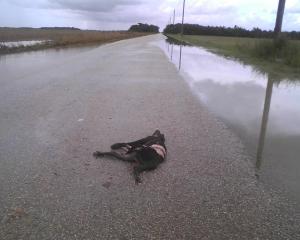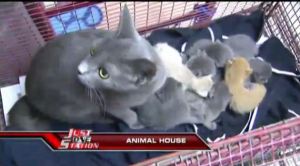We have moved!
18 MarNow, you can find out updated blog and web site at http://www.thenokillnation.org/blog
Text NKN to 27722 to Donate $10
5 DecGreat news! You can now text NKN to 27722 to donate $10 to our lifesaving efforts! Supporting the No Kill cause is as easy as picking up your cell phone.
During this special time of year, we hope you’ll think of our nation’s homeless companion animals. Your generous support allows us to continue working to save their lives, and insure a better tomorrow for our nation’s shelters.
With just a few seconds of your time, you can show your support for the crucial reform of our nation’s animal shelters. Through legislation, educational efforts, local initiatives and much more, we’re working daily for the achievement of a No Kill Nation.
Thank you from the bottom of our hearts for your support!
(Standard text & data rates may apply.)
15 Dogs Rescued in the Everglades in One Day
4 NovLast Saturday, the dedicated volunteers of the 100+ Abandoned Dogs of the Everglades project loaded up and headed down to Homestead, ready to rescue. The goal: to bring in as many dogs as possible, get them vetted and cared for, then adopt them out to loving homes.
The day began with a bang, as the team discovered a family of four dogs; mother, father and two young siblings; living at a Chevron station. They were able to capture the two young pups, but had to go back for the mom and dad. The mom was eventually captured, but the dad is still on the loose. Volunteers plan to return to find him.
Next, a little dachshund and a beautiful yellow lab mix were found, running loose in a residential area. Rescuers scooped them up. The dachshund is heartworm positive and will be receiving treatment.
Soon thereafter, a man emerged from his home with a momma dog. He told the team she had recently birthed six puppies. Volunteers encouraged him to turn over the momma and the puppies, who were living under a wheelbarrow. Eventually, he relented, and the team took all seven family members in: the mother, six girls and six boys.
Next up – a sweet, loving pitty mix was found outside several apartment homes. Fully pregnant and extremely friendly, the team was able to take her in without issue. They named her Lana. Later, the vet discovered she’s pregnant with approximately 10 to 14 puppies! Along with Lana, a lovely shepard mix (later named Valentina) was captured, with a little more effort.
And lastly, volunteers in another part of the region rescued a little rat terrier.
All in all, this day of rescued resulted in 15 lives saved, in addition to the 10-14 puppies Lana’s carrying.
This lifesaving work is possible thanks to the generosity of our supporters! Vetting and caring for these animals is extremely expensive. Thanks to people like you, our incredible local vet partners, and the community at large, we’ve been able to save more than 100 dogs thus far, and many have found forever homes. Sadly, there are still many more dogs to save, but we won’t stop until our work is complete.
To donate to our cause, please visit our ChipIn here. You may also donate via credit card by calling the NKN office at 888-589-4188, by mailing a check or dropping one off at:
837 Southeast 8th Ave, Suite 201
Deerfield Beach, FL 33441
For drop offs, please call the above number in advance to set up a time.
Drop off locations are also available in Miami. Please email fladogs@thenokillnation.org for more information on those locations.
We are also in need of many items from our Amazon wishlist! You can view those items here.
No Kill Nation, Inc., is a 501c3 public charity, so all donations are tax-deductible.
No Kill Miami Launches Campaign to Make Miami-Dade County Newest No- Kill Community in America
17 OctNo Kill Miami is launching an unprecedented campaign to bring the Miami-Dade community and Miami-Dade Animal Services (MDAS) together, for the very first time, to end the killing of healthy and treatable animals at our tax-payer funded, open- admission shelter. This exciting collaboration will focus on implementing new lifesaving programs and policies based on the best performing shelters across the country. Collectively known as the “No Kill Equation,” these programs and policies have helped numerous communities across the country achieve save rates of 90 percent or better.
“A collection of concerned animal-loving citizens, and leading animal welfare advocates, No Kill Miami is addressing a long-standing history of killing at MDAS. Miami-Dade Animal Services killed roughly 22,000 companion animals at the shelter last year, over 60 percent of all dogs and cats. We believe that staggering level of killing does not reflect our community’s values,” says Debi Day, Director of No Kill Miami.
With the appointment of a compassionate new director at MDAS, the opportunity for change is ripe, and No Kill Miami is calling on the community to support this new lifesaving mission.
We are asking the public to visit http://www.nokillmiami.org to learn about the many important ways they can help us end the killing today. For those without computer access, please call us toll free at 888-589-4188.
We are looking for a variety of volunteers to help us implement these No Kill programs, which include fostering neonatal puppies and kittens, promoting off-site adoptions, organizing fundraising events, providing pet owners with information to address behavioral and medical problems, and launching public relations and marketing campaigns to get the community involved in this exciting lifesaving mission.
About No Kill Miami:
NoKillMiami.org is an animal welfare think tank compromised of concerned animal-loving citizens, prominent figures in the community, animal welfare experts, animal law attorneys, shelter volunteers, and community veterinarians working to make Miami-Dade a No Kill Community.
MDAS Offering Temporary $0 Fee for Rescuers to Take Cats
22 SepMiami-Dade Animal Services (MDAS) is offering a $0 fee for rescuers looking to take cats, for a limited time only! MDAS is experiencing a power outage, and is looking to find as many homes as possible for over a hundred cats taken in from a hoarding situation this week. Interested rescuers should get to the shelter immediately to take advantage of this special offer.
And please spread the word about this special promotion. These kitties deserve a fresh start after all they’ve been through.
MDAS is located at 7401 Northwest 74th Street, Medley, FL. Their phone number is (305) 884-1101, and their hours of operation are Monday through Friday, 10 a.m. to 6 p.m., and Saturday and Sunday, 10 a.m. to 4 p.m.
100 Cats Up for Adoption at Miami Dade Animal Services
22 Sep100 cats are up for adoption at Miami-Dade Animal Services (MDAS) after they were surrendered due to a hoarding situation. A West Hialeah, Florida, woman was taking in strays for years with the intent to help them, but became overwhelmed with the number of cats living in her apartment.
These kitties ranges in ages from kittens to adult cats, and many suffer from infections or other illnesses. Those who are sick are now being nursed back to health by Animal Services’ vet staff. There are adorable kittens, frisky young adults, big cuddly cats, and much more. Whatever you’re looking for in a feline, you’ll find amidst this large group of cats in need. Many are immediately available to be adopted into loving homes.
MDAS is reaching out to the community for help in this dire situation. Foster homes, adopters and volunteers are all needed immediately.
To adopt, foster or help one of these special kitties, please visit Miami-Dade Animal Services at 7401 Northwest 74th Street, Medley, FL. Their phone number is (305) 884-1101, and their hours of operation are Monday through Friday, 10 a.m. to 6 p.m., and Saturday and Sunday, 10 a.m. to 4 p.m.
Please consider opening your hearts and homes to assist these cats. They’re in urgent need of new homes!
Could Texas Be the First No Kill State?
21 SepThe No Kill movement in Texas is on a roll. Austin and Williamson County have maintained 90%+ save rates for six months and counting, Seagoville has instituted a No Kill policy, and Rockwall has managed a 97% live outcome for August and a 90% mandated save rate as they move forward. Obviously, the Lone Star state is making its mark.
Additionally, San Antonio, whose leaders have been talking about going No Kill for some time (unsuccessfully), has recently demoted its director in the hopes of making positive change. It could be a step in the No Kill direction for the city.
Some have speculated that Virginia may be the first No Kill state, as they have a significant number of no or low kill communities, but it looks like Texas is in the running, too.
I foresee a lifesaving battle ahead! Hopefully, other states will jump into the competition, and the No Kill movement will continue to widen its reach. Every day, more and more animal lovers are learning the truth about our nation’s shelters, and as time passes, they simply won’t stand for the status quo. The possibilities are endless – and one day, we will be a No Kill Nation.
Support Bastrop Fire Rescue Efforts
16 SepRecently, the Bastrop County wildfires were an expected and horrific blight on the lives of thousands of Texans. These devastating fires have destroyed hundreds of homes, and forced thousands of people and animals to flee.
If you haven’t already, please consider donating to Austin Pets Alive!’s tireless rescue efforts for the Bastrop fire disaster. Austin Pets Alive! and other organizations have been doing outstanding work – reuniting pets with their owners, finding families for homeless pets, rescuing trapped animals, feeding and caring for displaced pets, and so much more. You can stay abreast of Austin Pets Alive!’s efforts through their Facebook page.
Here’s a link to a fund which goes directly to Austin Pets Alive! Thank you for your generous support.
The No Kill Equation
31 AugFor those who may be new to the No Kill movement, below is an explanation of the No Kill Equation (NKE). The NKE is the only program proven to lead to No Kill success. It involves 11 simple steps, which, when implemented by a shelter, lead to increased live outcome rates and drastic drops in killing.
The NKE has been successfully applied in Reno, Nevada; Tompkins County, New York; Shelby County, Kentucky; Charlottesville, Virginia, and many other communities across the US.
The No Kill Equation works, period. But, it does take hard work, dedication, and a compassionate, innovative leader at the helm. A halfhearted attempt at the programs will NOT be effective. They must all be aggressively implemented in order to reap the lifesaving rewards.
I. Feral Cat TNR Program
Trap Neuter Release (TNR) programs are the only proven effective methods of reducing a feral cat population, and No Kill communities across the country have embraced these tactics as a method of drastically reducing shelter intake and saving lives.
II. High Volume, Low-Cost Spay/Neuter
Low or no-cost, high volume spay/neuter programs are a key component to reducing shelter intake, and become especially effective over time. Reducing intake allows for additional resources to be allocated to other shelter necessities.
III. Rescue Groups
Rescue groups are an invaluable element of the NKE. Any transfer of an animal to a rescue group reduces taxpayer cost for vet care and boarding (or euthanasia), in addition to freeing up a kennel for another animal. A transfer to a legitimate rescue should never be refused by a shelter.
IV. Foster Care
Foster care is an irreplaceable way to drastically expand shelter capacity. Volunteer foster parents provide boarding, food and care for animals, and serve as key advocates for the shelter’s mission. These programs also save the lives of neonatal kittens and other animals who cannot survive in a shelter environment.
V. Comprehensive Pet Adoptions
You CAN adopt your way out of killing, but it takes hard work and innovation. There are 17 million families looking for pets each year, and three to four million killed in shelters. There are more than enough homes for our nation’s homeless pets, but shelters must compete with outside sources of animals – they must offer promotions, adoption specials and implement effective marketing programs to get pets out the door.
VI. Pet Retention
Many of the reasons people surrender their animals are preventable, but shelters must work with the public to help them retain their animals. Through offering advice and assistance to those in need, shelters can reduce intake and keep families together.
VII. Medical and Behavior Rehabilitation
A key part of any shelter’s responsibility is to insure the health & well being of its inhabitants. Animals must be treated for medical conditions and rehabilitated for behavioral issues. This step includes the implementation of proper cleaning, vaccination, evaluation and other protocols.
VIII. Public Relations/Community Involvement
Community support is key to No Kill success. By increasing public exposure for the shelter, the community will get involved, which means more donations, more volunteers, more adoptions and more lifesaving success.
IX. Volunteers
No Kill efforts cannot succeed without volunteers. They expand the shelter’s operational efforts without necessitating additional expense. They are invaluable, and the backbone of any successful shelter.
X. Proactive Redemptions
In Washoe County, Nevada, almost 65% of intake are returned to their owners, demonstrating the high percentage of animals that need only be redeemed. Actively working towards RTO efforts can drastically reduce shelter intake and kill rates.
XI. A Compassionate Director
The number one most important factor in reaching a No Kill community is effective leadership. Unless a shelter’s leader is progressive, compassionate and hard-working, other efforts are likely to fail. The leader dictates the policies & procedures of the organization, and if a leader makes a decision to stop the killing – it will stop.



